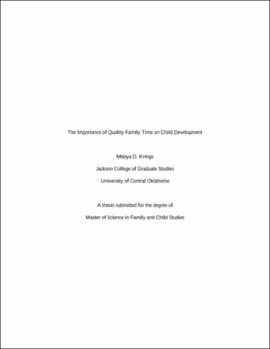| dc.contributor.advisor | Burr, Brandon | |
| dc.contributor.author | Krings, Mitaya D. | |
| dc.date.accessioned | 2023-09-07T19:16:00Z | |
| dc.date.available | 2023-09-07T19:16:00Z | |
| dc.date.issued | 2023 | |
| dc.identifier.other | (AlmaMMSId)9982970611102196 | |
| dc.identifier.uri | https://hdl.handle.net/11244/339449 | |
| dc.description.abstract | Minimal research has been done to date on how family time and children's activities impact a child's development. The amount of quality time that families spend together has decreased in recent years and children have fallen behind in different developmental areas. This idea prompts the question if there is a correlation between how children spend their time and the child's developmental state. A longitudinal study uncovered that how a mother spends time impacts her child's behavior and academics. This study found a positive link between maternal education levels and the child's academic success as well as increased time spent with the mother, the child displayed less "delinquent behaviors" (Milkie et al., 2015). Another study aimed to discover how COVID-19 impacted a child's behavior, speech and language. This study found that children with disadvantaged backgrounds fell behind on their social skills (Ofsted, 2020). The results displayed that about � of the participants thought that these areas had improved with families spending more time talking and reading together. Hofferth & Sandberg (2001) reported on how family factors impacted the child's behaviors and cognitive abilities. The results indicated that child's activities as well as demographics played a role in family activities which influenced the child's development. This correlational study aims to further investigate how family time may impact a child's development. The online survey allowed participants to answer questions about demographics, how the child spent time, how parents spent time with their child, and the child's behavior and academic abilities. Findings suggest that how a child spends their time, impacts their behavior and academic achievements. Race, parental education, time spent eating, reading for pleasure, and family time all had impacted the child's behavior or their academic abilities. Some of these findings have consistencies with past research to suggest that family time is important for a child. For example, children who read for pleasure scored higher on achievement tests. Results also suggest that the amount of time spent engaged in family activities decreased behavioral issues in the child. With the limited number of participants in the current study, future research should aim to expand their number of participants. Interviewing participants may also result in consistent interpretation of all survey questions. In addition, future researchers may analyze the activities studied to determine if new activities should be addressed. | |
| dc.rights | All rights reserved by the author, who has granted UCO Chambers Library the non-exclusive right to share this material in its online repositories. Contact UCO Chambers Library's Digital Initiatives Working Group at diwg@uco.edu for the permission policy on the use, reproduction or distribution of this material. | |
| dc.subject.lcsh | Child development | |
| dc.subject.lcsh | Families | |
| dc.subject.lcsh | Children--Conduct of life | |
| dc.title | The importance of quality family time on child development | en_US |
| dc.type | Academic theses | |
| dc.contributor.committeeMember | Atkins, LaDonna | |
| dc.contributor.committeeMember | Choudry, Mansur | |
| dc.thesis.degree | M.S., Family and Child Studies | |
| dc.subject.keywords | Child development | |
| dc.subject.keywords | Family time | |
| dc.subject.keywords | Children | |
| dc.subject.keywords | Child's developmental state | |
| dc.subject.keywords | Academic achievements | |
| dc.subject.keywords | Child's behavior | |
| dc.subject.keywords | Individual and family studies | |
| dc.subject.keywords | Behavioral sciences | |
| dc.subject.keywords | Cognitive psychology | |
| dc.identifier.oclc | (OCoLC)1397070393 | |
| thesis.degree.grantor | Jackson College of Graduate Studies | |
